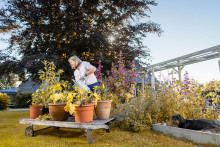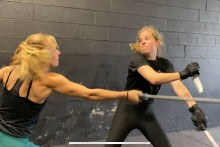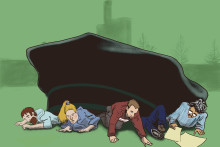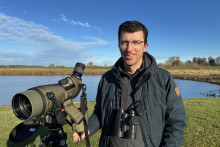‘I work as a social psychologist. In my research, I focus on the interaction between people. That is a big difference compared to, say, mathematicians or physicists who work on theoretical problems and formulas. They are the first people to come to mind when I think about eureka moments. I am interested in the natural behaviour of different groups in extreme situations. My goal is to research those situations in as controlled a manner as possible, without any disrupting influences and in accordance with ethical guidelines. That can be quite a difficult feat to achieve. Developing a research project requires a lot of creativity.'
'During any research, we can often only focus on a small aspect of our field. That is why I want to think carefully about what we are researching. What is the problem, really? The organisations involved often do not even know that themselves. I usually spend some time with them, ask as many questions as I can and try to gather all possible information. Only after acquiring all this input can I let it brew. An excellent way to do that is while I am working in my garden.'
'Gardening is a time to get my head straightened out'
'For me, gardening is a time to get my head straightened out. Before long, the insights I need come to me. If I do not work in my garden for a week, it really starts to affect me. I absolutely need those moments of reflection. I believe it is about stimulating associative thought processes. Those insights do not appear out of thin air. First, I have to gather all kinds of perspectives and ideas. I put myself into other people’s shoes and gather the ingredients I need for my research. Only then can my garden revelations begin to stir.'
'During the week, I do not really have enough time for this. Luckily, I can spend my weekends in our garden. We have a large one-and-a-half-hectare garden where I can find all the peace and quiet I need. I love every aspect of gardening, from the hard work of cutting down or trimming trees to working in the vegetable garden and the greenhouse where we are growing tomatoes, cucumbers and herbs. What I love most is that every plant needs love and attention in its own unique way. A tomato does not thrive on what a cucumber needs and vice versa.'
During those moments of reflection, I write a scenario for the research. How can I study the problem at hand in a clever manner? What should I use as a theoretical framework? Are there existing scientific instruments we can use or do we have to develop something entirely new, e.g. using the latest technologies? Those are the questions I ask myself. Furthermore, the practical contributions of our research are an important aspect of my work. Once I have found the solution and know how we can set up the research, it can definitely feel like a eureka moment.’







